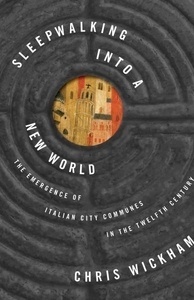Sleepwalking into a New World
The Emergence of Italian City Communes in the Twelfth Century

Editorial Princeton
Fecha de edición febrero 2015 · Edición nº 1
Idioma inglés
EAN 9780691148281
320 páginas
Libro
encuadernado en tapa dura
Resumen del libro
Amid the disintegration of the Kingdom of Italy in the eleventh and twelfth centuries, a new form of collective government the commune arose in the cities of northern and central Italy. Sleepwalking into a New World takes a bold new look at how these autonomous city-states came about, and fundamentally alters our understanding of one of the most important political and cultural innovations of the medieval world.
Chris Wickham provides richly textured portraits of three cities Milan, Pisa, and Rome and sets them against a vibrant backcloth of other towns. He argues that, in all but a few cases, the elites of these cities and towns developed one of the first nonmonarchical forms of government in medieval Europe, unaware that they were creating something altogether new. Wickham makes clear that the Italian city commune was by no means a democracy in the modern sense, but that it was so novel that outsiders did not know what to make of it. He describes how, as the old order unraveled, the communes emerged, governed by consular elites chosen by the people, and subject to neither emperor nor king. They regularly fought each other, yet they grew organized and confident enough to ally together to defeat Frederick Barbarossa, the German emperor, at the Battle of Legnano in 1176.
Sleepwalking into a New World reveals how the development of the autonomous city-state took place, which would in the end make possible the robust civic culture of the Renaissance.
Biografía del autor
Chris Wickham es doctor en Historia por la Universidad de Oxford. Ha dado clases en la Universidad de Birmingham desde 1975 y actualmente es profesor de Historia medieval. Es editor de Past and Present desde 1995. En Crítica ha publicado Una historia nueva de la Alta Edad Media (2008) y Europa en la Edad Media (2017).








